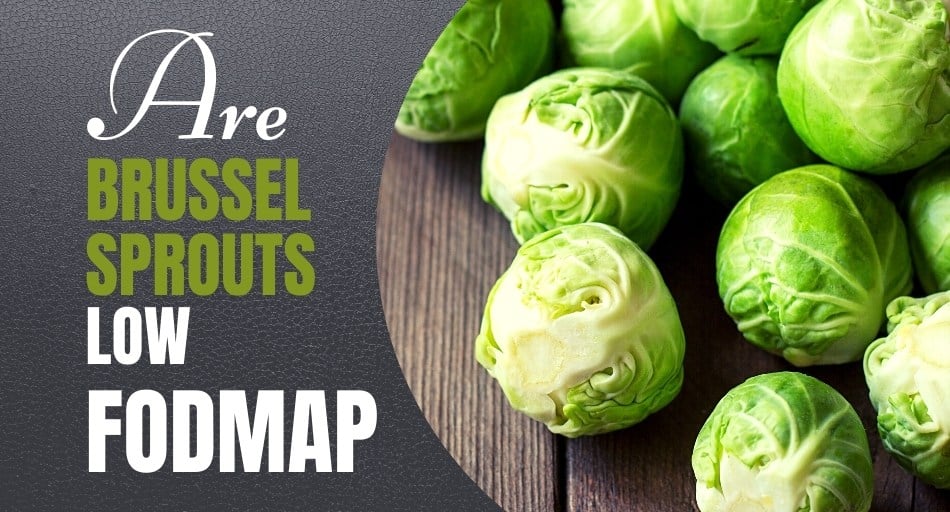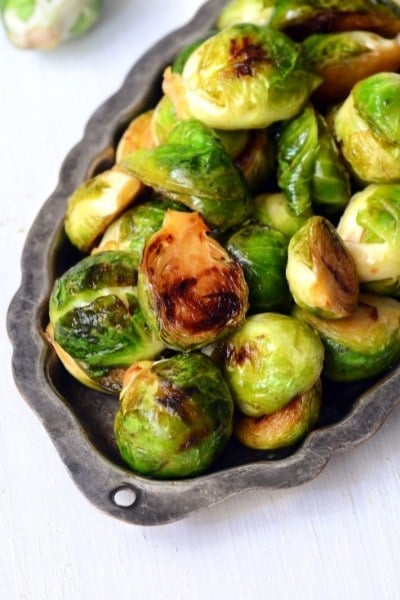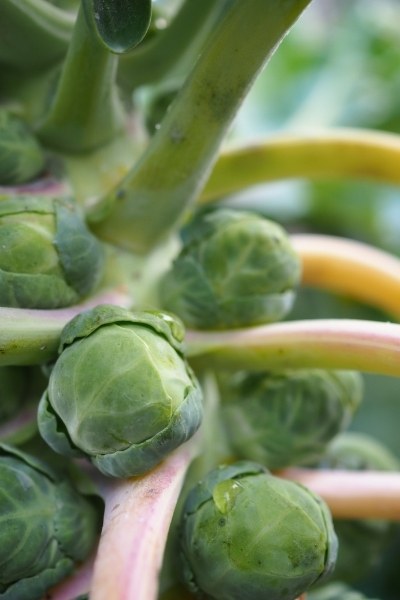A low FODMAP diet is a great way to manage the symptoms of irritable bowel syndrome (IBS). This diet limits the consumption of indigestible carbs that often worsen digestive system issues, so it’s very good for IBS.

In order to follow this diet, you have to be aware of which foods don’t contain too many FODMAPs. Many vegetables are allowed on a low FODMAP diet, but in small quantities.
For example, brussels sprouts still contain some indigestible, fermentable carbs. But are they high or low in them?
Table of Contents
Are Brussels Sprouts Low FODMAP?
Brussels sprouts are relatively low in FODMAPs, which makes them suitable for a low FODMAP diet. But, as with every food, it’s important to keep portion sizes in mind, as too many brussels sprouts in one sitting can trigger IBS symptoms.
If you choose to include small quantities of brussels sprouts in your diet, you can get a lot of health benefits from them.
For example, this veggie is low in calories but high in vitamin C, vitamin K, folate, and manganese. So, eating brussels sprouts is very good for your health.

How low in FODMAPs are brussels sprouts?
According to experts, brussels sprouts are relatively low in FODMAPS, but the serving size is important. If you consume 38 g or two brussels sprouts in one sitting, you shouldn’t experience any worse symptoms of IBS.
It’s important to keep the portion sizes small, though. So, try eating brussels sprouts along with other foods that are low in FODMAPs.
Some people might be able to tolerate a ½-cup serving of brussels sprouts as well. But start off small to ensure that your body doesn’t react negatively to the carbs found in brussels sprouts.
Can you eat brussels sprouts on a low FODMAP diet?
Brussels sprouts are allowed on a low FODMAP diet as long as you practice moderation.
A small serving can still help you get a lot of health benefits from this veggie without triggering any adverse digestive system side effects.
It’s also best to consume boiled or steamed brussels sprouts. This is because these cooking methods preserve most of the nutrients found in this vegetable without adding unnecessary calories and carbs.
Are brussels sprouts good for you?

Brussels sprouts are very nutritious but low in calories. A ½-cup serving contains only about 28 calories, most of which come from carbohydrates.
The same serving also provides you with 2 g of fiber, around 8% of your daily need.
The fiber found in brussels sprouts helps feed the ‘good’ gut bacteria and soak up excess stomach acid.
Because of that, eating brussels sprouts can improve the health of your digestive system and reduce the risk of heartburn.
In addition, half a cup of brussels sprouts contains as much as 137% of your daily recommended need for vitamin K. This amount makes brussels sprouts an excellent source of this fat-soluble vitamin.
Vitamin K is crucial for blood clotting, bone metabolism, ad blood calcium regulation. This vitamin dissolves in fats, so make sure to eat brussels sprouts and other vitamin K-rich foods with a source of healthy fat to ensure good absorption.
Brussels sprouts also provide you with a lot of vitamin C, nearly 80% of your daily need in a ½-cup serving.
This micronutrient, also called ascorbic acid, is crucial for the growth, development, and repair of all your tissues. It also boosts your immune system.
So, including a lot of vitamin C-rich foods in your diet can reduce your risk of catching various viral diseases.
In addition, brussels sprouts also contain a great dose of manganese. This mineral helps in the formation of connective tissue, bones, blood-clotting factors, and sex hormones.
It also helps your body metabolize carbohydrates and regulate blood sugar levels.

Brussels sprouts also provide you with some other minerals, including potassium, iron, and magnesium.
Unfortunately, many people these days suffer from mineral deficiencies. So, eating brussels sprouts can help prevent them.
What’s more, just half a cup of cooked brussels sprouts contains 12% of your daily need for folate. Also called vitamin B9, folate helps reduce the risk of birth defects of the spine and brain during early pregnancy. So, it’s crucial to get this nutrient.
Folate also aids in the formation of red blood cells and helps your cells grow and function. Because of that, make sure to include folate-rich foods, like brussels sprouts, in your diet.
Aside from nutrients, brussels sprouts are a rich source of powerful antioxidants. These plant compounds help flush out free radicals from your body, preventing oxidative damage to your cells.
Oxidative damage is closely linked with a higher risk of chronic conditions like heart disease, diabetes, and cancer.
So, eating a lot of antioxidant-rich foods can help lower your risk of these issues.
Brussels sprouts are also a great source of ALA omega-3 fatty acids. These fatty acids are beneficial for the health of your heart, brain, immune system, lungs, and blood vessels.
Generally, people who consume fish and seafood get enough of these fatty acids. But if you don’t eat these foods, adding some brussels sprouts to your diet can help you load up on them.

Eating brussels sprouts may also lower your risk of diabetes by maintaining healthy blood sugar levels.
Studies show that eating a lot of foods rich in fiber and the plant compounds that brussels sprouts contain can reduce your risk of diabetes and improve insulin levels.
So, there are no downsides to adding brussels sprouts to your diet.
Conclusion
Small amounts of brussels sprouts can be a great addition to a low FODMAP diet. As long as you consume them in moderation, you can safely eat this veggie even if you suffer from IBS or other digestive system issues.
In addition, brussels sprouts are very nutritious while being low in calories. They’re a great source of antioxidants, fiber, and various vitamins and minerals.
So, having some every once in a while can greatly benefit your health.
Sources: Nutrition Data, PMC, and National Library of Medicine
